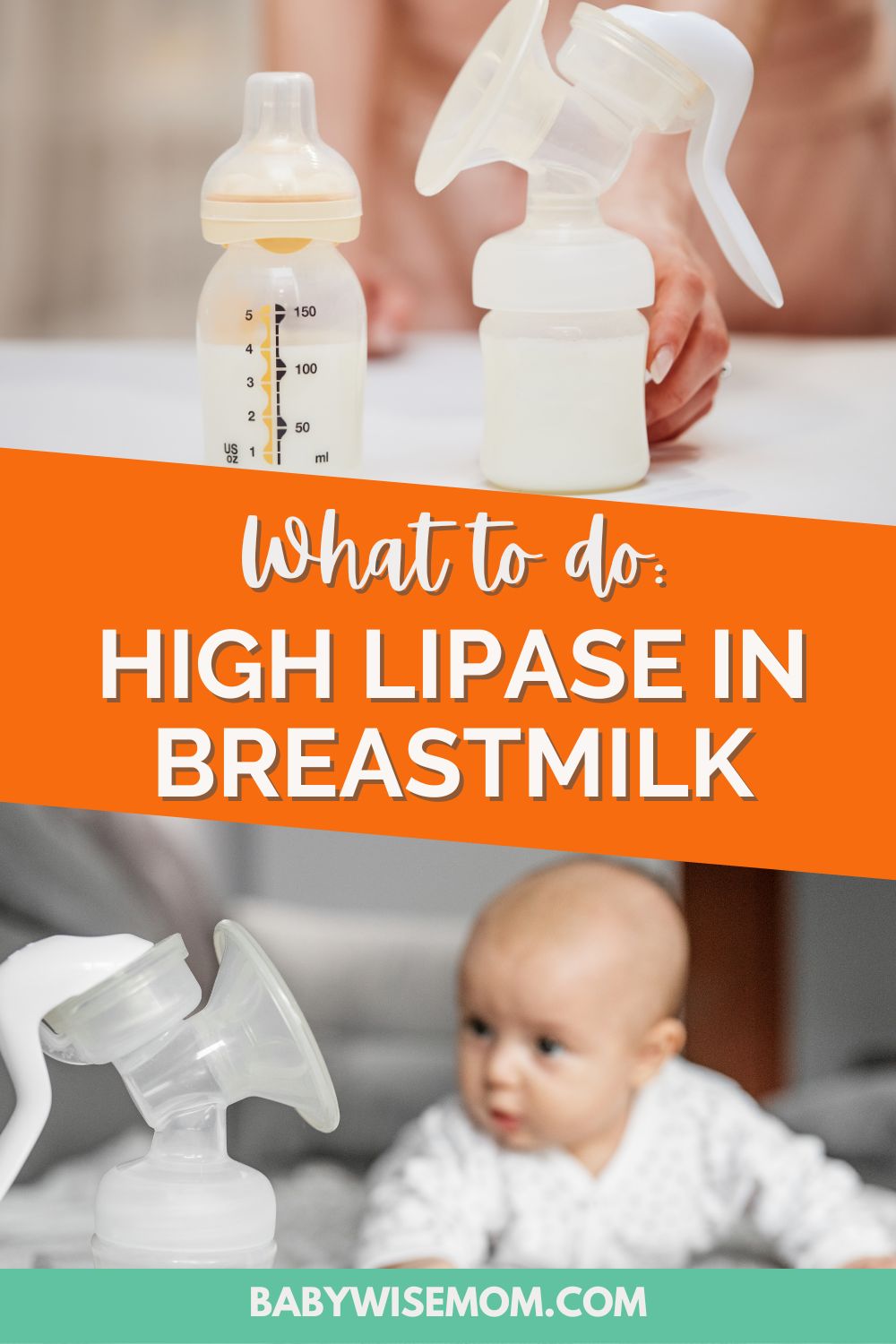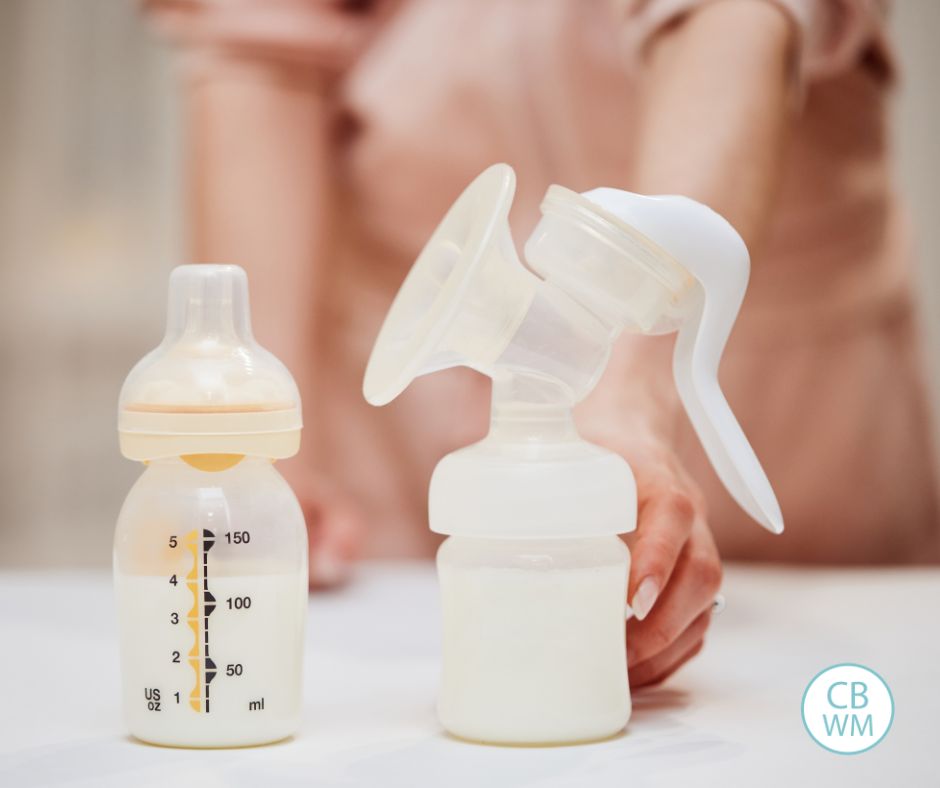High lipase in breastmilk can lead to baby refusing to drink pumped milk. Find out what is lipase, how do you know if it is high, what causes it to be high, how to prevent it, and what to do about high lipase in breast milk.
Breastfeeding moms know that it is a lot of work to pump and feed your baby. It can be very disheartening if your baby does not want to drink that pumped milk.
If you find your baby is unwilling to drink your pumped or expressed milk, you might have high lipase in your breast milk.
What Is Lipase in Breastmilk?
Lipase is a natural enzyme found in all breastmilk. This enzyme is used to aid in digestion and break down the lipids in breast milk.
How Do You Know if Your Milk is High in Lipase?
If you have excess lipase, you might find that your baby will not drink your milk after you pump it.
After you pump your milk, the enzymes can start to get to work. After about 12-14 hours, you might notice a change in the odor or flavor of the milk.
Milk high in lipase will have a metallic or soapy smell or taste.
The milk’s smell can also be fishy or sour.
If you find baby is not interested in your milk after it has sat o been stored for a period of time, you can test to see if you might have high lipase.
Pump your milk. Smell it and even taste it. Pay attention to how the breastmilk smells when it is fresh milk.
Put the milk in the fridge for a day. Then smell it and taste it again. If the order and taste has changed, you probably have high lipase.
If your baby will happily breastfeed but will not drink expressed milk from a bottle, one reason might be high lipase. You can try feeding fresh expressed milk from the bottle immediately. You can also try feeding formula.
If your baby will drink the fresh milk or formula, you likely have a lipase problem. If not, your baby might just hate drinking from a bottle.
What Causes High Lipase in Breast Milk?
High lipase activity is caused by an increased rate of the breaking down
Is High Lipase Bad?
No it is not bad! There is nothing wrong with you and you have not done anything wrong to cause this.
High lipase breast milk is still safe to drink.
The only problem with it is if your baby does not like the taste of your milk. Not all babies will refuse mother’s milk if it is high in lipase. I had high lipase. Some of my babies were fine with that and others were not.
How Do You Prevent High Lipase Milk?
The good news is you did nothing to cause this. The bad news is that you cannot do anything to stop or prevent this.
>>>Read: 5 Things to Know About Exclusively Pumping
What Do You Do if You Have High Lipase Breastmilk?
While you cannot prevent it, there are things you can do to hopefully get baby drinking it.
One thing you can do is use the milk quickly. If you do not need to build up a freezer stash, you can pump and use the milk before the 12-14 hour mark. That way your baby can drink it before the taste or aroma changes.
You might not be able to use the milk quickly. You might work and pump while gone. You might be pumping to build up a store for the future. Whatever the reason, there are still other options.
One thing you can try is to lower the pressure and speed of the pump. Some people find this helps. It might not help, but it is worth giving it a try.
You can also scald the milk before storing it. To safely scald breast milk:
- Put your milk in a clean pan and put it on the stovetop (do not put in the microwave)
- Heat the milk just until it bubbles. Do not boil it (this will destroy nutrients). You want the edges to bubble
- Remove from heat
- Cool the milk quickly in an ice bath
- Store safely in the refrigerator or freezer
If you are at work and cannot scald on a stove top, you can try the process in a bottle warmer.
You can also try serving the milk at room temperature or chilled. Cooler milk might mask the flavor for your baby.
You can also mix your pumped milk. You can mix half fresh with half stored or you can mix the milk into your baby’s solid foods if your baby is old enough to eat solids. You are just looking to get the nutrients and calories into baby. It is okay if they go in through the solid foods.
If you do not need to feed your baby through a bottle, you have some flexibility here. It is nice to keep baby used to drinking from a bottle because you never know what the future will bring. If you are trying to feed milk simply to keep baby used to the bottle, you can just pump right before baby gets up and feed the fresh milk in a bottle. You could also just feed some formula and pump and dump in order to keep up supply, or pump and freeze for mixing with solid foods later.
Scalding takes a bit of work, but if you need to store the milk, it is your best option.
>>>Read: 5 Things You Really Need to Know About Bottle Feeding
What Else Could It Be?
If you have sour-smelling or tasting breastmilk, it doesn’t automatically mean that you have high lipase.
You might need to clean your breast pump parts better. Make sure all parts are clean and dry. I know you are exhausted, but it isn’t worth the work of pumping if things aren’t clean and spoiling the milk.
You will also want to check all milk storage containers and make sure those are clean and dry before using them.
You can also consider your diet. Sometimes rancid-smelling fats like fish oil can change your milk.
>>>Read: Fussy Newborns and Mom’s Diet
Your milk might also just have simply gone bad. After you express milk, make sure you store it right away. Be aware of storage guidelines for storing human milk.
Related Posts



